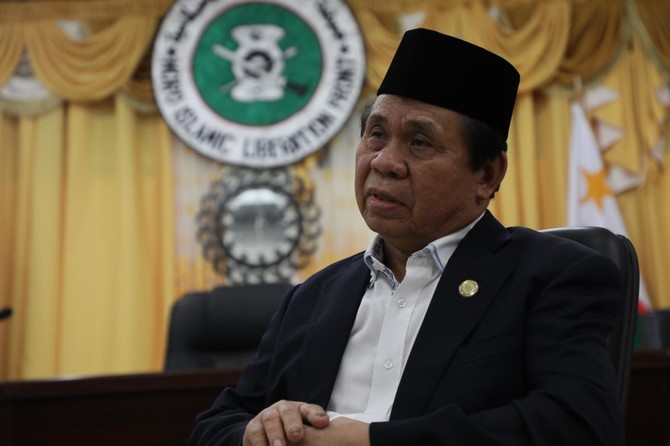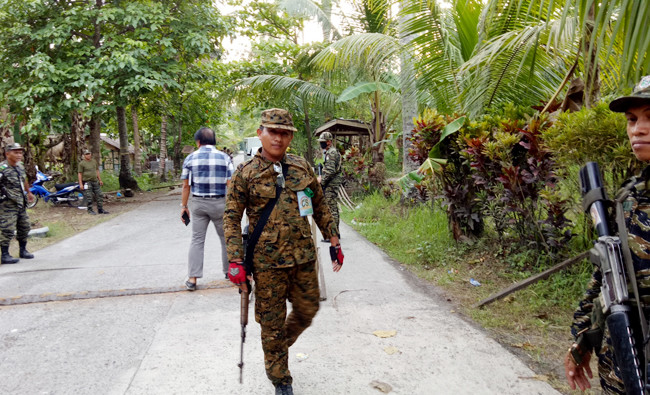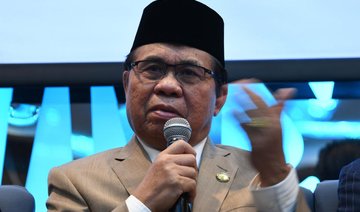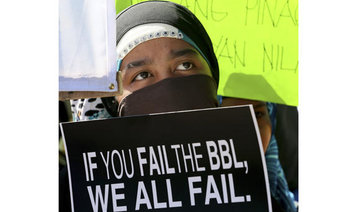SULTAN KUDARAT, Southern Philippines: The leader of the Moro Islamic Liberation Front (MILF) has promised the rebel group will not return to violence in its struggle to win self-determination for the Bangsamoro people.
MILF chair Al-Hajj Ebrahim Murad told Arab News: “War is not an option. The real solution (to the problem in Mindanao) is political.”
In an interview to Arab News at the group’s camp in Sultan Kudarat, Maguindanao, Murad said MILF was “holding on” to Philippines President Rodrigo Duterte’s pledges regarding the Bangsamoro Basic Law (BBL), legislation that will establish the Bangsamoro Autonomous Region as a political entity.
Murad revealed details of a MILF meeting with Duterte on March 27.
“We briefed him about our observation on the status of the BBL in Congress ... that the BBL is facing challenges, particularly in the House of Representatives. So we sought his advice on how we could move forward and also asked him to intervene so that the law will be passed as soon as possible,” said Murad.
The president promised “that he will do his best in order to push forward the BBL,” Murad said.
The Bangsamoro Basic Law came out of a 2014 agreement between the government and the MILF that recognizes the “justness and legitimacy of the cause of the Bangsamoro people.”
For decades the group led an armed struggle to win self-determination for the Bangsamoro people, with the peace deal coming only after 17 years of negotiation.
The agreement was expected to pave the way for a Bangsamoro autonomous political entity. But it has been four years and the Philippines Congress has yet to pass the law to establish the region.
Despite the delay, the MILF leadership remains hopeful that the BBL will be passed by Congress in May or before Duterte’s next address to the nation in July.
In the Senate, Murad said the group had held discussions with Sen. Miguel Zubiri, who sponsored the bill in the upper chamber. “(Zubiri) was looking forward to finishing the process in the next session of Senate which is in May,” he said.
Murad said there were two versions of the bill in the lower house — one by Speaker Pantaleon Alvarez, which complies with the BBL crafted by the Bangsamoro Transition Commission (BTC), and another sponsored by former president and now Pampanga representative Gloria Macapagal Arroyo.
“I spoke to her (Arroyo) ... by phone and asked if it was possible to withdraw her bill and just support the Alvarez version. And over the phone, she told me, yes, she will withdraw,” said Murad. “She gave her commitment and I hope that she will make true with that commitment.”
Asked about the effects of the delay on the BBL, Murad said: “Of course, there is some negative impact. There is frustration among our people.
“But we are trying to contain the frustration of our people, and we are also trying our best to push the peace process forward,” he said, adding that “the chances of passing the BBL are still high.”
Murad also expressed concerns that “there is a possibility of watering (the law) down.”
“In the lower house, we found out there are about 341 provisions that were touched. There are some amendments, so we need to really engage them,” he said.
A number of congressmen also opposed the BBL. “They are few, but they are more aggressive. That is why there are some challenges.”
Should Congress fail to pass the BBL, Murad said he was concerned that this would add to the Bangsamoros’ frustration.
“They will feel that there is no more chance of passing the BBL. Because this president is the first who openly supports the BBL.
“He is the first president from Mindanao who really understands the problem of the Bangsamoro and has accepted the injustices against the Bangsamoro,” said Murad.
“So if (the law) cannot be passed within his administration then that will result in a strong sense of frustration among the people,” he said.
This sense of injustice could lead to more people joining radical groups. “That is what we are concerned (about),” he said.
Asked about the MILF’s options if the BBL is not passed, Murad said the group would not return to violence.
“War is not an option,” he said. “The real solution is political.”
Murad said the organization would continue its four-point program of strengthening, military build-up, self-reliance and Islamization.
“We will see what is the appropriate step. But we have already invested so much in the peace process. So whatever happens we will try to protect the gains of the peace process,” he said.
However, the MILF was also prepared to take a defensive stand, Murad said.
“Defense, it can be. We will continue our activities, but if government troops attack us, we have no option but to fight back. But we will continue our activities as an Islamic revolutionary organization,” he said.
“It’s not an option, but we are ready for it. Hopefully, it doesn’t happen that the BBL fails because that will really strengthen the campaign of the extremists.”
Murad said the Bangsamoro Islamic Freedom Fighters group was formed after an agreement on ancestral domain failed in 2008.
“We were together. But after the non-signing, everybody was frustrated. And there was an outbreak of hostilities.”
Until there was a political solution, “fighting any group will not succeed,” he said.
‘War not an option’: MILF leader vows to pursue peaceful path to justice, autonomy
‘War not an option’: MILF leader vows to pursue peaceful path to justice, autonomy

- MILF chair Al-Hajj Ebrahim Murad told Arab News: “War is not an option. The real solution (to the problem in Mindanao) is political.”
- For decades MILF led an armed struggle to win self-determination for the Bangsamoro people, with the peace deal coming only after 17 years of negotiation.
Canadian university teachers warned against traveling to the United States

- The Canadian government recently updated its US travel advisory, warning residents they may face scrutiny from border guards and the possibility of detention if denied entry
HALIFAX, Nova Scotia: The association that represents academic staff at Canadian universities is warning its members against non-essential travel to the United States.
The Canadian Association of University Teachers released updated travel advice Tuesday due to the “political landscape” created by President Donald Trump’s administration and reports of some Canadians encountering difficulties crossing the border.
The association says academics who are from countries that have tense diplomatic relations with the United States, or who have themselves expressed negative views about the Trump administration, should be particularly cautious about US travel.
Its warning is particularly targeted to academics who identify as transgender or “whose research could be seen as being at odds with the position of the current US administration.”
In addition, the association says academics should carefully consider what information they have, or need to have, on their electronic devices when crossing the border, and take actions to protect sensitive information.
Reports of foreigners being sent to detention or processing centers for more than seven days, including Canadian Jasmine Mooney, a pair of German tourists, and a backpacker from Wales, have been making headlines since Trump took office in January.
The Canadian government recently updated its US travel advisory, warning residents they may face scrutiny from border guards and the possibility of detention if denied entry.
Crossings from Canada into the United States dropped by about 32 percent, or by 864,000 travelers, in March compared to the same month a year ago, according to data from US Customs and Border Protection. Many Canadians are furious about Trump’s annexation threats and trade war but also worried about entering the US
David Robinson, executive director of the university teachers association, said that the warning is the first time his group has advised against non-essential US travel in the 11 years he’s worked with them.
“It’s clear there’s been heightened scrutiny of people entering the United States, and … a heightened kind of political screening of people entering the country,” said Robinson, whose association represents 70,000 teachers, librarians, researchers, general staff and other academic professionals at 122 universities and colleges.
Robinson said the group made the decision after taking legal advice in recent weeks. He said lawyers told them that US border searches can compromise confidential information obtained by academics during their research.
He said the association will keep the warning in place until it sees “the end of political screening, and there is more respect for confidential information on electronic devices.”
Afghan children will die because of US funding cuts, aid official says

- More than 3.5 million children in Afghanistan will suffer from acute malnutrition this year, an increase of 20 percent from 2024
Afghan children will die because of US funding cuts, an aid agency official said Tuesday.
The warning follows the cancelation of foreign aid contracts by President Donald Trump’s administration, including to Afghanistan where more than half of the population needs humanitarian assistance to survive.
Action Against Hunger initially stopped all US-funded activities in March after the money dried up suddenly. But it kept the most critical services going in northeastern Badakhshan province and the capital Kabul through its own budget, a measure that stopped this month.
Its therapeutic feeding unit in Kabul is empty and closing this week. There are no patients, and staff contracts are ending because of the US funding cuts.
“If we don’t treat children with acute malnutrition there is a very high risk of (them) dying,” Action Against Hunger’s country director, Cobi Rietveld, told The Associated Press. “No child should die because of malnutrition. If we don’t fight hunger, people will die of hunger. If they don’t get medical care, there is a high risk of dying. They don’t get medical care, they die.”
More than 3.5 million children in Afghanistan will suffer from acute malnutrition this year, an increase of 20 percent from 2024. Decades of conflict — including the 20-year US war with the Taliban — as well as entrenched poverty and climate shocks have contributed to the country’s humanitarian crisis.
Last year, the United States provided 43 percent of all international humanitarian funding to Afghanistan.
Rietveld said there were other nongovernmental organizations dealing with funding cuts to Afghanistan. “So when we cut the funding, there will be more children who are going to die of malnutrition.”
The children who came to the feeding unit often could not walk or even crawl. Sometimes they were unable to eat because they didn’t have the energy. All the services were provided free of charge, including three meals a day.
Rietveld said children would need to be referred to other places, where there was less capacity and technical knowledge.
Dr. Abdul Hamid Salehi said Afghan mothers were facing a crisis. Poverty levels among families meant it was impossible to treat severely malnourished children in private clinics.
“People used to come to us in large numbers, and they are still hoping and waiting for this funding to be found again or for someone to sponsor us so that we can resume our work and start serving patients once more.”
Magnitude 5.6 earthquake strikes Hindu Kush region, Afghanistan, EMSC says

- EMSC first reported the quake at a magnitude of 6.4
KABUL: An earthquake of magnitude 5.6 struck the Hindu Kush region in Afghanistan on Wednesday, the European-Mediterranean Seismological Center (EMSC) said.
The quake was at a depth of 121 km (75 miles), EMSC said, and the epicenter 164 km east of Baghlan, a city with a population of about 108,000.
EMSC first reported the quake at a magnitude of 6.4.
US plans to use tariff negotiations to isolate China, WSJ reports

- US officials plan to use negotiations with more than 70 nations to ask them to disallow China to ship goods through their countries and prevent Chinese firms from being located in their territories to avoid US tariffs
WASHINGTON: US President Donald Trump administration plans to use ongoing tariff negotiations to pressure US trading partners to limit their dealings with China, The Wall Street Journal reported on Tuesday citing people with knowledge of the conversations.
US officials plan to use negotiations with more than 70 nations to ask them to disallow China to ship goods through their countries and prevent Chinese firms from being located in their territories to avoid US tariffs, the report added.
UNICEF projects 20 percent drop in 2026 funding after US cuts

- UNICEF has implemented some efficiency measures but “more cost-cutting steps will be required,” said the spokesperson
UNITED NATIONS: UNICEF has projected that its 2026 budget will shrink by at least 20 percent compared to 2024, a spokesperson for the UN children’s agency said on Tuesday, after US President Donald Trump slashed global humanitarian aid.
In 2024, UNICEF had a budget of $8.9 billion and this year it has an estimated budget of $8.5 billion. The funding for 2025 is “evolving,” the UNICEF spokesperson said.
“The last few weeks have made clear that humanitarian and development organizations around the world, including many UN organizations, are in the midst of a global funding crisis. UNICEF has not been spared,” said the spokesperson.
UNICEF did not specifically name the US, but Washington has long been the agency’s largest donor, contributing more than $800 million in 2024. Since UNICEF was established in 1946, all its executive directors have been American.
“At the moment, we are working off preliminary projections that our financial resources will be, at a minimum, 20 percent less, organization wide, in 2026 compared to 2024,” said the UNICEF spokesperson.
Since returning to office in January for a second term, Trump’s administration has cut billions of dollars in foreign assistance in a review that aimed to ensure programs align with his “America First” foreign policy.
The UN Office for the Coordination of Humanitarian Affairs said last week that it will cut 20 percent of its staff as it faces a shortfall of $58 million, after its largest donor, the United States, cut funding.
UN Secretary-General Antonio Guterres also last month said he is seeking ways to improve efficiency and cut costs as the world body turns 80 this year amid a cash crisis.
UNICEF has implemented some efficiency measures but “more cost-cutting steps will be required,” said the spokesperson.
“We are looking at every aspect of our operation, including staffing, with the goal of focusing on what truly matters for children: that children survive and thrive,” the spokesperson said. “But no final decisions have been taken.”


























